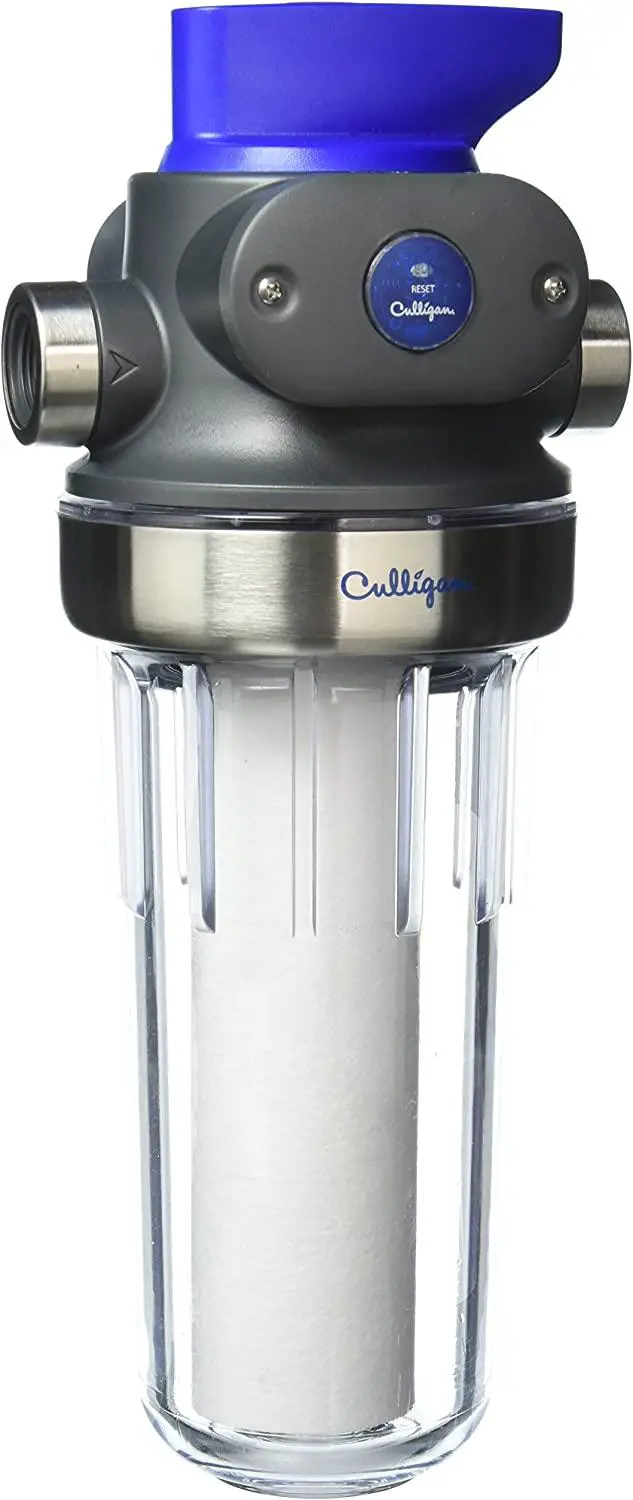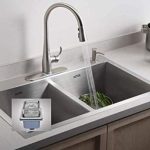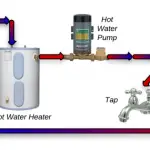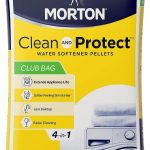The micron size of the filter is what would determine the ability of the filter in cleaning the well water. it is always a good idea to check out the right micron size for preventing getting the bad water condition. What micron filter is best for well water? Let us check out in the following steps.
The smaller is the size of the micron, the better would be your experience in filtering your water. A 5 micron filter can clear out the particle that you can see, while a 1 micron filter will be able to clear out the materials that cannot be seen with the naked eye. It is obviously advisable to look for the 1 micron filter than the 5-micron filter if you have a choice.
What Micron Filter is The Best For Well Water?
Finding the right micron size for your filter would depend on several factors – primarily among them being the water supply conditions in your region. Determine the type of contaminants present in your water supply and then you can select an appropriate micron size for your filter.
If your water supply has fine elements, you would need a 1 micron water filter. If you do not have an idea about which micron rating you would need for your water supply, it would be advisable to check out with the lower filter size. You can make a beginning with the 5 microns and then move down. The best micros would be the one that would provide you a service life of around 3 to 6 months.
What is Micron filter?
Micron filters are used for removing dirt, debris, and even microscopic particles in water. the pore size of the filter cartridge would be useful in measuring the right size of micros. The smaller micros rating will translate into the finer contaminants being removed. The right size of the micron filter would largely be dependent on the smallest size of the particulate material that you need to remove.
A 5-micron filter can remove particles as small as 5 microns. Anything smaller than that size will pass through the filter. The sediment filters are perhaps one of the examples when it comes to the 5-micron filters.
Different sizes of the micron sizes used in the filters would include
Sub micron filter
The sub-micron filter is the smallest size of the filters that are currently available. The filters come with pore sizes that are less than 1-micron size. That would make them the best pick for removing the smallest ever particles from your water.
1 Micron filter
If you are concerned with the microorganisms such as bacteria, the 1-micron filter would be the right pick. The 1-micron filters have been observed to be one of the excellent means as the last stage of whole-house water filters.
5-micron filter
5 microns filters are typically designed for cleaning up the smallest sediment sizes. They can be a good pick the filter for well water. They can remove all suspended material from the wwell water
25 micron filter
If your well water has granular particles, the filter would be the right pick to remove all those big sediments and particles
50-micron filter
The 50 micron filter is the best pick to help you remove the sediments that are visible to the human eye. The common examples would include dust, sand, and fine particles.
100-micron filter
The 100 micron filter is the filter capable of removing visible water contaminants. It would be a good option to help you clear out chunks of rust, sand, gravel, and dirt.
1 micron vs 5-micron water filter – How do they compare with one another?
Choosing between the 1-micron water filter and 5-micron water filter is not a tough choice as such. It would generally boil down to what you would want to remove from water. The difference between the may be quite small.
The primary difference between the 1 micron and 5-micron water filter lies in the size of the particles that these filters can remove. A 1 micron filter can remove the particles that are as small as 1 micron in size. The 5-micron filter can remove particles as small as 5 microns in size. The 1 micron filter is thus capable of removing the smaller particles from the water than the 5-micron filter.
If your water contains a high concentration of sediments such as silt or sand. A 5 micron filter is more suitable for the water that has larger particles, such as rust or scale. It may be noted that even when the smaller micron size is capable of filtering the smaller particles from the water supply, it is likely to reduce your flow rate. That would mean the flow rate on a 1 micron filter is very lesser than the 5 micron filter.
The table here should provide you with the complete information on the differences between the 1 micron water filter and 5 micron water filter:
| Feature | 1-Micron Filter | 5-Micron Filter |
| Pore size | 1 micron | 5 microns |
| Particle removal | Smaller particles, such as silt or sand. | Larger particles, such as rust or scale. |
| Filtration effectiveness | Higher | Lower |
| Water flow rate | Slower | Faster |
| Filter replacement frequency | More frequent | Less frequent |
| Suitable for water with | High concentration of fine sediment | Moderate to low concentration of larger particles |
| Applications | Pre-filter for reverse osmosis systems, aquariums, food service, and beverage industries. | Whole-house water filtration systems, irrigation systems, and general purpose sediment filtration. |
Nominal Vs Absolute Micron Ratings – What Are They?
The difference between the nominal and absolute micron ratings would be dependent on the amount of sediments and contaminants. They are almost the same, but just indicate the filtering capacity in two different ways.
When it comes to water filtration, there are two terms you may come across that relate to the pore size of a filter: “absolute micron” and “nominal micron”. Here’s what these terms mean:
Absolute Micron: This is the smallest particle size that a filter can remove with an efficiency of 99.9%. In other words, a filter with an absolute micron rating of 1 micron can remove 99.9% of particles that are 1 micron or larger in size.
Nominal Micron: This is a rough estimate of the particle size that a filter can remove. It represents the average particle size that a filter can capture, but it does not indicate the filter’s actual efficiency at removing particles of that size. For example, a filter with a nominal micron rating of 5 microns may capture most particles that are 5 microns or larger, but it may also allow some smaller particles to pass through.
It’s important to note that the absolute and nominal micron ratings of a filter are not interchangeable, and they do not necessarily indicate the same level of filtration. In general, a filter with a lower absolute micron rating will provide better filtration than a filter with a higher absolute micron rating or a filter with a nominal micron rating.
When selecting a water filter, it’s important to pay attention to the absolute micron rating rather than the nominal micron rating, as this will give you a better idea of the filter’s actual filtration capabilities.
Check out the table here below for understanding the complete differences between the absolute micron rating and nominal micron rating
| Nominal micron rating | Absolute micron rating | |
| Meaning | An approximate rating that can vary by +/- 10-20% | An exact rating |
| Accuracy | Low | High |
| Filter | Captures some particles larger than the rating | Captures all particles above the rating |
| Example | A nominal 20 micron filter may capture some particles that are 15-25 microns in size | An absolute 20 micron filter will capture all particles that are 20 microns in size or larger |
Best Well Water Sediment Filters
The major contaminants that you would find in a well water filter are sediment, sand and silt. They would impact the lifespan of your whole water filtration systems. How would you choose the best well water sediment filters that you would want to check out?
Let us explore a few top-end well water sediment filters that you would find quite decent enough.
iSpring WSP50ARB Spin Down Sediment Water Filter
The iSpring WSP50ARB Spin Down Sediment Water Filter is your best bet for the best overall sediment filter for well water. It is effective and low maintenance in nature. The filter comes with a rating of 50 microns. It can remove sediment particles, rust particles, sand particles, and other debris.

Features
- Type: Spin-down
- Micron Rating: 50
- Filter Life: 12 months
- Flow Rate: 35 GPM
- Max Pressure: 140 PSI
- Warranty: 1 year
The filter offers you a 12 month filter life which should further make it a very decent pick. If you are a tech lover, you would find it to be one of the perfect versions for the best overall water filter for well water.
- High-definition touch screen-based automatic flush mode
- BPA free compatibility
- 25 GPM flow rate
- Significantly costlier
- Needs a regular maintenance
Culligan WH-S200-C Whole-House Sediment Water Filtration System
The Culligan WH-S200-C Whole-House Sediment Water Filtration System is the best cartridge-based water filtration system. It should be the right pick for people who are on a lower budget. It can be one of the excellent well water filters for small families and households.

Features
- Type: Cartridge
- Micron Rating: Depends on cartridge
- Filter Life: 2 – 4 months
- Flow Rate: 4 GPM
- Max Pressure: 125 PSI
- Annual Cost: ~$70
- Warranty: 2 years
Compatibility with multiple cartridges would be one of the prime features. The filter does provide you access to 2 to 4 months of filter lifespan. The convenient features and durable design along with the certified components would ideally make it a value for money.
- Offers a great degree of flexibility
- Choose between 50 and 50 micros
- Affordable pricing
- Built in bypass valve.
- Annual spending may be heavy
- Lower flow rate
What impurities does 1 micron and 5 micron filters remove?
Understanding the water supply and the types of contaminants is what would make the choice of your micron filter one of the best fixes.
What does 5 micron sediment filter remove?
The 5 micron filter can remove the following impurities
- Almost all types of bacteria
- Some cysts
- Asbestos
- Dust
- Sand
- Silt
- Molds
What impurities does 1 micron filters remove?
The 1 micron can filter can remove the following ingredients
- A lot of bacteria
- All the cysts
- Clay
- Lead
- Plant spores
- Paint pigments
Which is Better – 1 micron or 5 Micron Filter?
The answer to this question depends on the specific application and the level of filtration required. In general, a 1 micron filter will provide better filtration than a 5 micron filter. This is because a 1 micron filter can capture smaller particles than a 5 micron filter. However, a 1 micron filter may also have a higher pressure drop than a 5 micron filter, which means that it may reduce the flow of fluid or air more than a 5 micron filter.
If the application requires very fine filtration, such as in the pharmaceutical or semiconductor industry, a 1 micron filter may be necessary to achieve the required level of cleanliness. However, if the application requires less stringent filtration, such as in the automotive or oil industry, a 5 micron filter may be sufficient and more cost-effective.
Ultimately, the choice between a 1 micron and 5 micron filter depends on the specific requirements of the application, including the size and type of particles to be filtered, the flow rate, and the budget.
The Concluding Thoughts
The micron filter is what would help you in achieving the best standards in terms of cleaning your well water for almost all your requirements in getting some decent drinking and cooking water. You would also find it a perfect option to help you get some excellent bathing water as well. The tips above in what filter you should use and which among them works best should provide you a very decent inputs on understanding every need that you may have.












Add Comment